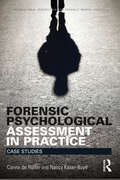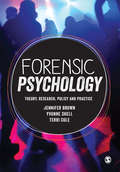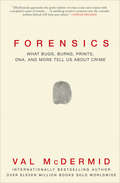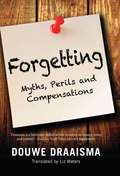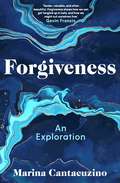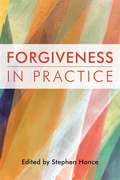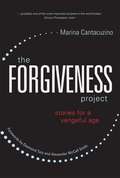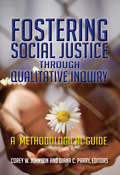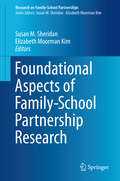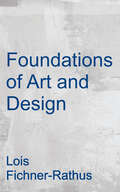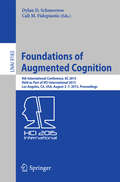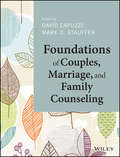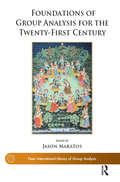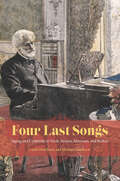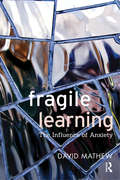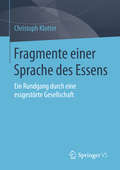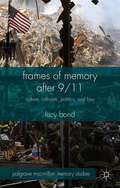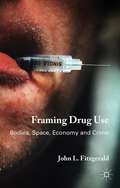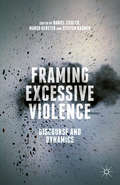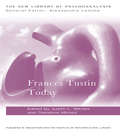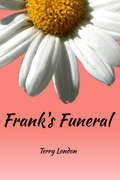- Table View
- List View
Forensic Psychological Assessment in Practice: Case Studies (International Perspectives on Forensic Mental Health)
by Corine de Ruiter Nancy Kaser-BoydForensic Psychological Assessment in Practice: Case Studies presents a set of forensic criminal cases as examples of a scientist-practitioner model for forensic psychological assessment. The cases involve a number of forensic issues, such as criminal responsibility, violence risk assessment, treatment planning, and referral to long term forensic care. Likewise, different types of offenses are covered, for example, sexual offending, arson, homicide, robbery and domestic violence. The authors address a variety of mental disorders including psychosis, posttraumatic stress disorder, psychopathy and other personality disorders. The book will be useful for novice and experienced forensic psychologists and psychiatrists who are looking for case studies that integrate the most recent empirical evidence with psychological test findings.
Forensic Psychology: Theory, research, policy and practice (Critical Concepts In Psychology Ser.)
by Terri Cole Yvonne Shell Jennifer BrownInstructors - Electronic inspection copies are available or contact your local sales representative for an inspection copy of the print version. 'This fascinating book examines some of the ideological underpinnings of forensic psychological research, policy and practice. It is refreshingly reflective and a significant contribution to the field. I strongly recommend it.' - Professor Graham Towl, Durham University and formerly Chief Psychologist at the Ministry of Justice 'The strength of this book is the complexity of concepts and topics covered mean that it is suitable for students who wish to be challenged.’ - Dr Louise Almond, University of Liverpool 'This is a book for people who like to think. It presents the realities of practice with the challenges of theory and asks the reader to shake off complacency. It is insightful and challenging but most of all, it is very readable.' - Professor Joanna R. Adler, Middlesex University Students of Forensic Psychology need to learn how to combine practical skills such as report writing or assessments with a critical understanding of both theory and the wider political and policy landscape that surrounds the profession. Mapped to the British Psychological Society’s Stage One and Two training requirements for forensic psychologists Forensic Psychology: Theory, Research, Policy and Practice will help you understand how these crucial areas of the profession interact and how they can shape one another. Throughout the text the authors provide a detailed analysis of key concepts, debates and theories while weaving in insights and reflections from key professionals, ensuring you have the necessary knowledge and skills to pass assignments and get past the stage 2 supervised practice requirements en route to becoming a qualified forensic psychologist. This text will be essential reading for all those on MSc Forensic Psychology courses, and will also be a useful reader for those on practitioner doctorates as well as the already qualified needing to keep up with the CPD. The book is also a useful companion to professionals in allied criminal justice professions.
Forensic Psychology: Theory, research, policy and practice (Critical Concepts In Psychology Ser.)
by Terri Cole Yvonne Shell Jennifer BrownInstructors - Electronic inspection copies are available or contact your local sales representative for an inspection copy of the print version. 'This fascinating book examines some of the ideological underpinnings of forensic psychological research, policy and practice. It is refreshingly reflective and a significant contribution to the field. I strongly recommend it.' - Professor Graham Towl, Durham University and formerly Chief Psychologist at the Ministry of Justice 'The strength of this book is the complexity of concepts and topics covered mean that it is suitable for students who wish to be challenged.' - Dr Louise Almond, University of Liverpool 'This is a book for people who like to think. It presents the realities of practice with the challenges of theory and asks the reader to shake off complacency. It is insightful and challenging but most of all, it is very readable.' - Professor Joanna R. Adler, Middlesex University Students of Forensic Psychology need to learn how to combine practical skills such as report writing or assessments with a critical understanding of both theory and the wider political and policy landscape that surrounds the profession. Mapped to the British Psychological Society's Stage One and Two training requirements for forensic psychologists Forensic Psychology: Theory, Research, Policy and Practice will help you understand how these crucial areas of the profession interact and how they can shape one another. Throughout the text the authors provide a detailed analysis of key concepts, debates and theories while weaving in insights and reflections from key professionals, ensuring you have the necessary knowledge and skills to pass assignments and get past the stage 2 supervised practice requirements en route to becoming a qualified forensic psychologist. This text will be essential reading for all those on MSc Forensic Psychology courses, and will also be a useful reader for those on practitioner doctorates as well as the already qualified needing to keep up with the CPD. The book is also a useful companion to professionals in allied criminal justice professions.
Forensics: What Bugs, Burns, Prints, DNA, and More Tell Us About Crime
by Val McDermidVal McDermid is one of the finest crime writers we have, whose novels have captivated millions of readers worldwide with their riveting narratives of characters who solve complex crimes and confront unimaginable evil. In the course of researching her bestselling novels McDermid has become familiar with every branch of forensics, and now she uncovers the history of this science, real-world murders and the people who must solve them. The dead talk to the right listener. They can tell us all about themselves: where they came from, how they lived, how they died, and, of course, who killed them. Forensic scientists can unlock the mysteries of the past and help serve justice using the messages left by a corpse, a crime scene, or the faintest of human traces. Forensics draws on interviews with some of these top-level professionals, ground-breaking research, and McDermid’s own original interviews and firsthand experience on scene with top forensic scientists. Along the way, McDermid discovers how maggots collected from a corpse can help determine one’s time of death; how a DNA trace a millionth the size of a grain of salt can be used to convict a killer; and how a team of young Argentine scientists led by a maverick American anthropologist were able to uncover the victims of a genocide. It’s a journey that will take McDermid to war zones, fire scenes, and autopsy suites, and bring her into contact with both extraordinary bravery and wickedness, as she traces the history of forensics from its earliest beginnings to the cutting-edge science of the modern day.
Forgetting
by Douwe DraaismaIn his highly praised book The Nostalgia Factory, renowned memory scholar Douwe Draaisma explored the puzzling logic of memory in later life with humor and deep insight. In this compelling new book he turns to the "miracle" of forgetting. Far from being a defect that may indicate Alzheimer's or another form of dementia, Draaisma claims, forgetting is one of memory's crucial capacities. In fact, forgetting is essential. Weaving together an engaging array of literary, historical, and scientific sources, the author considers forgetting from every angle. He pierces false clichés and asks important questions: Is a forgotten memory lost forever? What makes a colleague remember an idea but forget that it was yours? Draaisma explores "first memories" of young children, how experiences are translated into memory, the controversies over repression and "recovered" memories, and weird examples of memory dysfunction. He movingly examines the impact on personal memories when a hidden truth comes to light. In a persuasive conclusion the author advocates the undervalued practice of "the art of forgetting"--a set of techniques that assist in erasing memories, thereby preserving valuable relationships and encouraging personal contentment.
Forgiveness: An Exploration
by Marina CantacuzinoI forgive you. Three simple words behind which sits an intriguing and complex concept. These words can be used to absolve a meaningless squabble, or said to someone who has caused you great harm. They can liberate you from guilt, or consciously place blame on your shoulders. Forgiveness can often be perceived as saccharine and overtly religious, something just for the spiritually superior or mentally strong. But really it is a gritty, risky concept that is so often relevant to our ordinary everyday lives. Forgiveness explores the subject from every angle, coming from a place of enquiry rather than persuasion, presenting it as an offering, never a prescription. Marina Cantacuzino seeks to investigate, unpick and debate the limits and possibilities of forgiveness – in our relationships, for our physical and mental wellbeing, how it plays out in international politics and within the criminal justice system, and where it intersects with religious faith. Cantacuzino speaks to people across the globe who have considered forgiveness in different forms and circumstances. She talks to a survivor of Auschwitz; to someone who accidentally killed a friend; to people who have lost loved ones in acts of violence; to a former combatant in The Troubles as well as to the daughter of someone he murdered. Through these real stories, expert opinion and the author&’s experience from two decades working in this field, the reader gets to better understand what forgiveness is and what it most definitely isn&’t, how it can be an important element in breaking the cycle of suffering, and ultimately how it might help transform fractured relationships and mend broken hearts.
Forgiveness in Practice
by Stephen Hance Howard Cooper Anthony Bash Reza Shah-Kazemi Vajragupta Gwen Adshead Jesse Butler Meadows Stephen Cherry Deborah Bowman Marian Liebmann Robin Shohet Christiane Sanderson Honor Rhodes Amanda Boorman Steve Nolan Richard Carter Graham Spencer Lord Alderdice Marina Cantacuzino Chris Cook Wendy Dossett Liz GullifordForgiveness has often viewed as a religious obligation but is increasingly being advocated as a means of healing, release and promoting wellbeing. Forgiveness is variously viewed as a duty, virtue or cure, but when it comes to practising forgiveness in real life we find it is always caught up in the complexity of the situation. This book shines a light on how we tend to think about forgiveness in practice, including examples from social work, family therapy, chaplaincy and criminal justice.The book contains many different perspectives on how we think about forgiveness, including overviews of four major religions and reflections from those working in the healing professions. Without advocating a particular approach this book raises important questions around self-forgiveness and forgiving institutions and encourages the reader to think again about forgiveness and how it impacts, challenges and transforms relationships.
The Forgiveness Project: Stories for a Vengeful Age
by Alexander Mccall Smith Archbishop Emeritus Desmond Tutu Marina CantacuzinoWhat is forgiveness? Are some acts unforgivable? Can forgiveness take the place of revenge? Powerful real-life stories from survivors and perpetrators of crime and violence reveal the true impact of forgiveness on ordinary people worldwide. Exploring forgiveness as an alternative to resentment or retaliation, the storytellers give an honest, moving account of their experiences and what part forgiveness has played in their lives. Despite extreme circumstances, their stories open the door to a society without revenge. All royalties from the sale of this book go to The Forgiveness Project charity.
Fostering Social Justice through Qualitative Inquiry: A Methodological Guide
by Corey W Johnson Diana C ParryQualitative researchers increasingly flock to social justice research to move beyond academic discourse and aid marginalized communities and groups. This is the first textbook to address the methods of conducting qualitative research using a social justice paradigm. The book addresses the differences that a social justice stance requires from the researcher, then discusses how major qualitative methodologies are employed to create social justice in both the process and products of qualitative research. In this book-chapters cover grounded theory, phenomenology, ethnography, participatory action research, and other key qualitative designs;-methods chapters are written by experts in that methodology;-case studies illustrate show this style of research in action;-material is tightly organized and edited for course use although there are multiple authors.
Foundational Aspects of Family-School Partnership Research
by Susan M. Sheridan Elizabeth Moorman KimThis volume focuses on how family-school partnerships are conceptualized, defined, and operationalized as well as the research that is needed to advance these foundational issues. Each chapter integrates prevailing approaches into a research-based framework for supporting learning from pre-K through high school. The book incorporates structural and relational methods into the larger context of educational processes to promote research about collaboration and to improve the academic and behavioral development of students. Diverse theories and models of family-school alliances demonstrate approaches and interventions that are goal-directed and strengths-based, respectful and responsive. In addition, the book analyzes cognitive, behavioral, and interpersonal aspects of partnership and discusses different methods of assessing parental involvement and student outcomes. Included in the coverage are innovative, agenda-setting discussions on: Definitions and conceptual frameworks of family-school partnerships. Need-satisfying partnerships. Diverse parent perspectives and participation. Measurement of family-school partnership constructs over time. Foundational Aspects of Family-School Partnership Research is an essential resource for researchers, professionals, and graduate students in child and school psychology, educational policy and politics, family studies, developmental psychology, sociology of education, sociology, and anthropology.
Foundations of Art and Design
by Lois Fichner-RathusPacked with hundreds of examples of classic and contemporary art, FOUNDATIONS OF ART AND DESIGN, 2E delivers a comprehensive guide to basic design that provides the ideal foundation to design principles. Appealing to readers at every ability level, the text's logical and structured organization moves from micro to macro topics, enabling learners to build on ideas and concepts of design and better understand the material. A running glossary defines key terms in the margins of the text, while two Visual Glossaries at the end of the book focus on styles and mediums. In addition, new "Theory and Practice" boxes help readers more deeply analyze artwork, and "Artists on Art" boxes offer insight from professional artists.
Foundations of Augmented Cognition
by Dylan D. Schmorrow Cali M. FidopiastisThis book constitutes the proceedings of the 9th International Conference on the Foundations of Augmented Cognition, AC 2015, held as part of the 17th International Conference on Human-Computer Interaction, HCII 2015, which took place in Los Angeles, CA, USA, in August 2015. HCII 2015 received a total of 4843 submissions, of which 1462 papers and 246 posters were accepted for publication after a careful reviewing process. These papers address the latest research and development efforts and highlight the human aspects of design and use of computing systems. The papers thoroughly cover the entire field of Human-Computer Interaction, addressing major advances in knowledge and effective use of computers in a variety of application areas. The 78 papers presented in the AC 2015 proceedings address the following major topics: cognitive performance and work load, BCI and operational neuroscience, cognition, perception and emotion measurement, adaptive and tutoring training, applications of augmented cognition.
Foundations of Couples, Marriage, and Family Counseling
by David Capuzzi Mark D. StaufferA comprehensive and practical approach to the world of marriage, couples, and family counselingEsteemed academics David Capuzzi and Mark D. Stauffer present the theory, research, and real-life practice of today's counselors and therapists in family therapy settings. Aligned with the Council for Accreditation of Counseling and Related Educational Programs (CACREP) and Commission on Accreditation for Marriage and Family Therapy Education (COAMFTE), this useful text covers foundational teaching important to readers, but also critical modern topics not included in other texts, such as sexuality, trauma, divorce, domestic violence, and addictions, filial play therapy, and using community genograms to position culture and context in family therapy.With a unique focus on practical applications, the book discusses the major family therapy theories, and provides graduate students and post-graduate learners in counseling, mental health, and behavioral health fields the skills and techniques they need to help couples and families as part of their work in a variety of helping environments. Each chapter contains case studies and anecdotes that help readers think critically about the issues they are likely to deal with as clinicians.Written by recognized and respected contributors, this book helps readers see the connection between what they know and what happens in couples and family counseling sessions. Readers will:Learn the knowledge and skills essential to family therapyUnderstand the history, concepts, and techniques associated with major theoriesExamine the key issues specific to couples work, with relevant interventionExplore solutions to the complexities generated by special issuesDiscusses the modern realities of family, diversity and culture, and systemic contextsFamily and couples counseling presents a complex interplay of various factors inherent to each individual, the dynamic interplay between each person's issues, and the outside influences that shape behavior. Foundations of Couples, Marriage, and Family Counseling helps readers sort out the complexity and guide clients toward lasting resolution.
Foundations of Group Analysis for the Twenty-First Century: Foundations (The New International Library of Group Analysis)
by Jason MaratosThe Institute of Group Analysis (IGA) celebrates forty years from its foundation with the publication of two new volumes tracing the foundations and applications of Group Analysis. The first volume ('Foundations') aims to publicise the foundations of group analysis (with the earliest papers of Foulkes) as well as the most influential theoretical contributions by pillars of modern group analysis, such as Pines, Brown, and Hopper. The reader will be able to see the development of Group Analysis, form an opinion about the trajectory that it follows, and judge which way the tradition of openness and creative integration of diverse theoretical contributions will lead in the twenty-first century. The second volume ('Applications') focuses on the numerous fields of work that use group analytic principles. Workers in the field of forensic psychotherapy would now consider it a great omission if they did not use some form of group analytic intervention, as would professionals dealing with those who manifest personality disorders, or those who work with different age groups, such as adolescents.
Four Last Songs: Aging and Creativity in Verdi, Strauss, Messiaen, and Britten
by Linda Hutcheon Michael HutcheonAging and creativity can seem a particularly fraught relationship for artists, who often face age-related difficulties as their audience s expectations are at a peak. In"Four Last Songs," Linda and Michael Hutcheon explore this issue via the late works of some of the world s greatest composers. Giuseppe Verdi (1813 1901), Richard Strauss (1864 1949), Olivier Messiaen (1908 92), and Benjamin Britten (1913 76) all wrote operas late in life, pieces that reveal unique responses to the challenges of growing older. Verdi s"Falstaff," his only comedic success, combated Richard Wagner s influence by introducing young Italian composers to a new model of national music. Strauss, on the other hand, struggling with personal and political problems in Nazi Germany, composed the self-reflexive"Capriccio," a life review of opera and his own legacy. Though it exhausted him physically and emotionally, Messiaen at the age of seventy-five finishedhis only opera, "Saint Francois d Assise," which marked the pinnacle of his career. Britten, meanwhile, suffering from heart problems, refused surgery until he had completed his masterpiece, "Death in Venice. " For all four composers, age, far from sapping their creative power, provided impetus for some of their best accomplishments. With its deft treatment of these composers final years and works, "Four Last Songs" provides a valuable look at the challenges and opportunities that present themselves as artists grow older. "
Four Ways to Click
by Daniel J. Siegel Amy Banks Leigh Ann HirschmanResearch shows that people cannot reach their full potential unless they are in healthy connection with others. Dr. Amy Banks teaches us how to rewire our brains for healthier relationships and happier, more fulfilling lives.We all experience moments when we feel isolated and alone. A 2006 Purdue University study found that twenty-five percent of Americans cannot name a single person they feel close to. Yet every single one of us is hardwired for close relationships. The key to more satisfying relationships--be it with a significant other, family member, or colleague--is to strengthen the neural pathways in our brains that encourage closeness and connection.There are four distinct neural pathways that correspond to the four most important ingredients for healthy and satisfying relationships: calmness, acceptance, emotional resonance, and energy. This groundbreaking book gives readers the tools they need to strengthen the parts of their brain that encourage connection and to heal the neural damage that disconnection can cause.
Four Ways to Click
by Daniel J. Siegel Amy Banks Leigh Ann HirschmanResearch shows that people cannot reach their full potential unless they are in healthy connection with others. Dr. Amy Banks teaches us how to rewire our brains for healthier relationships and happier, more fulfilling lives. We all experience moments when we feel isolated and alone. A 2006 Purdue University study found that twenty-five percent of Americans cannot name a single person they feel close to. Yet every single one of us is hardwired for close relationships. The key to more satisfying relationships--be it with a significant other, a family member, or a colleague--is to strengthen the neural pathways in our brains that encourage closeness and connection. In this groundbreaking book, Dr. Banks give us a road map for developing the four distinct neural pathways in the brain that underlie the four most important ingredients for close relationships: calmness, acceptance, emotional resonance, and energy. Four Ways to Click gives you the tools you need to strengthen the parts of your brain that encourage connection and to heal the neural damage that disconnection can cause.From the Hardcover edition.
Fragile Learning: The Influence of Anxiety
by David MathewWhat are the barriers and obstacles to adults learning? What makes the process of adult learning so fragile? And what exactly do we mean by Fragile Learning? This book addresses these questions in two ways. In Part One, it looks at challenges to learning, examining issues such as language invention in a maximum security prison, geography and bad technology, and pedagogic fragility in Higher Education. Through a psychoanalytic lens, Fragile Learning examines authorial illness and the process of slow recovery as a tool for reflective learning, and explores ethical issues in problem-based learning. The second part of the book deals specifically with the problem of online anxiety. From cyberbullying to Internet boredom, the book asks what the implications for educational design in our contemporary world might be. It compares education programmes that insist on the Internet and those that completely ban it, while exploring conflict, virtual weapons and the role of the online personal tutor.
Fragmente einer Sprache des Essens
by Christoph KlotterDer vorliegende Band beschäftigt sich zum einen mit der Reduktion des Essens auf eine naturwissenschaftliche Perspektive und moralisches Gebot und hebt zum anderen die kulturelle und soziale Bedeutung hervor. Seit der Entstehung der Ernährungswissenschaft Mitte des 19. Jahrhunderts haben wir uns daran gewöhnt, von Vitaminen, Proteinen und Kohlehydraten zu sprechen. Wir betrachten Lebensmittel aus naturwissenschaftlicher Sicht, lösen sie in einzelne Bestandteile auf und quantifizieren diese, um festzustellen, wie viel wir von welchem Inhaltsstoff zu uns nehmen müssen, um uns gesund zu ernähren. Die Ernährung hat dann die primäre Aufgabe, die Gesundheit zu erhalten und das Leben zu verlängern. Wer sich dieser Aufgabe verweigert, wie vermeintlich die Adipösen, darf moralisch verurteilt werden. Ernährung und Gesundheit haben sich so moralisiert. Somit wird mittels der empfohlenen Ernährung ein zentraler abendländischer Wert vermittelt, der der Mäßigung. Von Platon bis zur protestantischen Ethik, die unser Leben heute bestimmt, wird Mäßigung eingefordert, heute über das rigide Schlankheitsideal.
Frames of Memory after 9/11
by Lucy BondFrames of Memory makes an important intervention into the emerging body of scholarship surrounding the culture and politics of the post-9/11 world. Bond provides a sweeping analysis of American memorial culture after 11 September, examining the ways in which diverse modes of commemoration, from Acts of Congress to museum exhibits, the military commissions at Guantanamo Bay to the corpus of 9/11 trauma fiction, have adhered to delimiting templates of remembrance that present an artificial impression of a unified American response to the attacks. In so doing, the book poses a series of urgent questions about the ethical and political factors at stake in the work of memory, asking why, and with what consequences, commemoration becomes an ideological endeavour; in what ways the academic discipline of memory studies influences contemporary memorial practice, and vice versa; what it means to seek justice for the dead; and how we might open the exceptionalist and exclusionary culture of memory surrounding 9/11 to a more diverse, globally oriented engagement with the recent past. "
Framing Drug Use
by John L. FitzgeraldFraming Drug Use examines the forces that shape the way we use drugs. The book analyses space, streetscapes, languages, signs, photographs, stories, routines, social organisations and the frameworks of everyday life, which contribute to drug-related harm. This variously implicates the forces of economics, emotion, physical pleasure and culture. John Fitzgerald importantly proposes a new set of tools and a new framework for analyzing drug problems. The new framework suggests that care, compassion and responsibility might come to replace blame and punishment as central terms that define how we approach drug control.
Framing Excessive Violence: Discourse and Dynamics
by Daniel Ziegler Marco Gerster Steffen Kr�merThis book explores the dynamics of excessive violence, using a broad range of interdisciplinary case studies. It highlights that excessive violence depends on various contingencies and is not always the outcome of rational decision making. The contributors also analyse the discursive framing of acts of excessive violence.
Frances Tustin Today (New Library of Psychoanalysis)
by Judith L. Mitrani and Theodore MitraniFrances Tustin Today explores some of the ways and means by which Tustin’s work has enabled psychoanalytic clinicians to enter into the elemental domain of sensation: what Bion called the ‘proto-mental’ area of the psyche-soma. Through detailed clinical contributions of several of her exponents worldwide, this book demonstrates how her ideas -- rooted in decades of work with children on the autistic spectrum -- have influenced and are being expanded, extended and applied to the treatment of ordinary patients from early childhood through adulthood. The contributors to this volume represent a selection of the contemporary thinking that organically grew out of Tustin’s discoveries, and show that Tustin's model has added new dimensions to the fields of infant observation, family therapy and neuro-psychology. Each chapter is augmented by demonstrable clinical experience. Frances Tustin Today is a valuable resource for psychoanalysts, psychotherapists, educators and parents who are interested in learning more about this uniquely independent clinical observer's findings and their impact upon the treatment of autistic states in children, adolescents and adults by contemporary workers in the field of mental health. Judith L. Mitrani, and Theodore Mitrani, are Fellows of The International Psycho-Analytical Association, Training and Supervising Psychoanalysts at The Psychoanalytic Center of California in Los Angeles. They are founding members of the Board of Trustees of The Frances Tustin Memorial Trust, and authors, editors, translators and teachers in the private practice of psychoanalysis and psychoanalytic therapy with Adults and Children in Los Angeles, California.
The Frankfurt School, Jewish Lives, and Antisemitism
by Jack JacobsThe history of the Frankfurt School cannot be fully told without examining the relationships of Critical Theorists to their Jewish family backgrounds. Jewish matters had significant effects on key figures in the Frankfurt School, including Max Horkheimer, Theodor W. Adorno, Erich Fromm, Leo Lowenthal and Herbert Marcuse. At some points, their Jewish family backgrounds clarify their life paths; at others, these backgrounds help to explain why the leaders of the School stressed the significance of antisemitism. In the post-Second World War era, the differing relationships of Critical Theorists to their Jewish origins illuminate their distinctive stances toward Israel. This book investigates how the Jewish backgrounds of major Critical Theorists, and the ways in which they related to their origins, impacted upon their work, the history of the Frankfurt School, and differences that emerged among them over time.
Frank’s Funeral
by Terry LondonFrank was an abusive and violent alcoholic. Terry was his eldest daughter. Frank's 'mistress' was a dark and foreboding force throughout Terry's life -- while Frank was alive and well after his death. Terry suffered many beatings as a child and as an adult. Frank was very cruel. He had a warped idea of love. Frank's final wishes in his Last Will and Testament were difficult to comprehend. Sadly, Terry had to fight against members of her own family in the Supreme Court. Terry's raw and incredibly honest story is heartbreaking. Her sense of humour doesn't mask the sadness, but makes some of the words easier to read. This is a true story of strength and courage.
